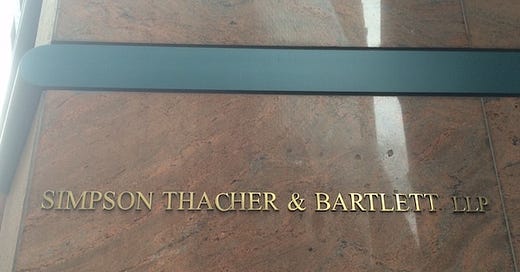Judicial Notice (12.30.23): Disqualified
A judge shows holiday kindness to counsel, a Biglaw firm goes Grinch on its associates, and other legal news from the week that was.
Welcome to Original Jurisdiction, the latest legal publication by me, David Lat. You can learn more about Original Jurisdiction by reading its About page, and you can email me at davidlat@substack.com. This is a reader-supported publication; you can subscribe by clicking here. Thanks!
Hello from the West Coast, where we’re visiting Zach’s brother and his family. We’ve been having a great trip, extreme weather notwithstanding. I hope you’ve also been able to spend time with loved ones during this quiet period between Christmas and New Year’s.
A quick reminder: as mentioned last week, tomorrow I’m raising the subscription rate for Original Jurisdiction from $5 a month and $50 a year to $6 a month and $60 a year. But consistent with Substack policy, if you subscribe at the current $5/$50 rate, you’ll keep that rate—a reward and expression of gratitude for your loyalty. So if you’ve been thinking of upgrading from a free to a paid subscription, now is a great time, since you’ll lock in the lower rate (as long as you don’t cancel and resubscribe).
Now, on to the news (of which there’s a fair amount, since I skipped Judicial Notice last weekend for Christmas).
Lawyers of the Week: Will Baude and Michael Stokes Paulsen.
As you’d expect for this time of year, the news cycle has been quiet, with one (big) exception: litigation seeking to disqualify former president Donald Trump from running for president again, based on Section Three of the Fourteenth Amendment. I discuss it in greater detail below, but for now, I’d like to recognize two incredibly influential intellectuals who have played a leading role in the Section Three movement: Professor William Baude, of the University of Chicago Law School, and Professor Michael Stokes Paulsen, of the University of St. Thomas School of Law. Their forthcoming article in the University of Pennsylvania Law Review, The Sweep and Force of Section Three, has served as the blueprint for many of the lawsuits filed across the country seeking to boot Trump from the ballot.
For the record, Baude and Paulsen didn’t “discover” Section Three or its potential application to politicians involved in the January 6 attack on the Capitol. Other academics, including Professors Akhil Reed Amar and Gerard Magliocca, have been writing about the provision for years—even before January 6. But Baude and Paulsen’s mammoth and magisterial article, in all its 126-page glory, lays out the most comprehensive case for applying Section Three to the Donald—and the media coverage surrounding it, including a New York Times article from August by Adam Liptak, made the case for disqualification go mainstream.
Why did their paper—which has been downloaded more than 104,000 times, and whose abstract has been viewed more than 303,000 times—go viral? The messengers here were arguably just as important as the message. As noted in the first paragraph of Liptak’s piece, Baude and Paulsen are “prominent conservative law professors,” “active members of the Federalist Society,” and “proponents of originalism, the method of interpretation that seeks to determine the Constitution’s original meaning.” Their strong conservative credentials made it difficult to dismiss their argument as politically motivated, and their impeccable reputations as scholars required their argument to be taken seriously. So if you love (or loathe) the movement to remove Trump from the ballot, give credit (or blame) to Will Baude and Michael Paulsen (who should have received at least an honorable mention in the Lawyer of the Year discussion that Sarah Isgur and I had in our 2023 year-in-review podcast).1
Other lawyers in the news (alas, for bad stuff):
As expected after the $148 million defamation verdict against him, former New York City mayor and U.S. attorney Rudy Giuliani filed for bankruptcy.
Another ex-associate of Donald Trump, former fixer Michael Cohen, took responsibility for fake case citations that wound up in a motion filed on his behalf before Judge Jesse Furman (S.D.N.Y.). This time around, ChatGPT wasn’t the culprit; Google Bard was being evil.
Brazilian lawyer Romero Cabral Da Costa Neto, who worked at Gibson Dunn as a visiting attorney, received a two-month prison sentence for insider trading based on information he gleaned while working at Gibson.
Judge of the Week: Judge Andrew Edison.
On December 19, Magistrate Judge Andrew M. Edison (S.D. Tex.) issued an order that read, in pertinent part, as follows:
Yesterday, Plaintiffs filed a motion for partial summary judgment. Under our local rules, a response to the motion is due January 8, 2024. To meet such a deadline, the lawyers would probably need to work over the next two weeks. You should spend as much time as you can with family and friends. Accordingly, I will sua sponte modify the briefing schedule. A response to the motion for partial summary judgment will now be due on Friday, January 19, 2024.… [H]appy holidays to all!
Lawyers praised Judge Edison’s order. As Raffi Melkonian commented on Twitter, “I’m not sure I can say it any better than the excellent Federal Magistrate Judge Andrew Edison.” Or as Texas appellate attorney Anne Johnson wrote in a LinkedIn post that went viral, with more than 240 reposts and 4,500 likes, “A standing ovation for Judge Edison! Lawyer burnout is real, and we need more of this in our profession.”
Judge Edison’s holiday spirit contrasts sharply with the attitude of partners at Simpson Thacher in London. What did they do to incite the ire of their associates?
Keep reading with a 7-day free trial
Subscribe to Original Jurisdiction to keep reading this post and get 7 days of free access to the full post archives.




